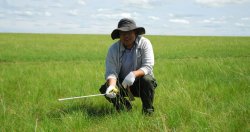Remote Sensing Lab Research Update – Bao Gang
Variability of Vegetation Net Primary Productivity on the Mongolian Plateau 1982 – 2010 and its Response to Climate Change
Posted in: Research

In October 2015 a grassland remote sensing expert from Inner Mongolia Normal University (IMNU), Huhehaote, China, will arrive at Montclair State University to work in the Remote Sensing Laboratory alongside Earth & Environmental Studies Department professor Mark Chopping. International visiting scholar Bao Gang has conducted and published research on tracking grassland productivity using NASA and NOAA satellite data and plans to extend this initiative with the 12-month project “Variability of Vegetation Net Primary Productivity on the Mongolian Plateau 1982 – 2010 and its Response to Climate Change”. The project aims to model terrestrial vegetation net primary productivity (NPP) on the Plateau, including the Mongolian People’s Republic and Inner Mongolia Autonomous Region, China, using a regionally optimized version of the Carnegie Ames Stanford Approach (CASA) ecosystem model. This will allow a thorough examination of spatiotemporal dynamics in vegetation NPP on the Plateau over more than three decades, helping us to identify and quantify the contributions of climatic and human drivers.
During his stay, Bao Gang will advance research that provides the most recent information on dynamics in vegetation NPP and its responses to climate variables in arid and semiarid ecosystems. This is important as the satellite record lengthens and becomes more informative on decadal time scales. It will help us to understand what recent climate-driven vegetation changes have occurred in the arid and semiarid areas of Eurasia, and why. Climate-driven changes in the geographic distribution of precipitation are of particular concern in this region – as in California and the western US, though both climatic and human drivers differ – and important differences between Eurasian and North American NPP trends have been observed that remain to be understood.
Bao Gang’s selection of the Department of Earth and Environmental Studies at Montclair State University was owing to the recognized expertise in satellite-based vegetation mapping, with NASA-supported projects on community type mapping and tracking carbon pools in semi-arid environments. Mark Chopping has long experience in Inner Mongolia Autonomous Region, having carried out fieldwork in the Xilingol grasslands in 1993, 1996, and 2012, including surveys for his doctoral research. During the 2012 trip meetings were held in the IMNU Remote Sensing Laboratory that led to the discovery of research topics of mutual interest. His stay at Montclair State University is fully supported by the Chinese Scholarship Council, the Chinese Ministry of Education’s non-profit organization that provides student financial aid to Chinese citizens and foreigners to study abroad or to study in China, respectively. It is hoped that this project will help to establish a solid and ongoing collaboration between researchers and institutions in this area, as well as enriching the experiences of Montclair State University students who take remote sensing classes, providing them with broader perspectives.
